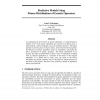Free Online Productivity Tools
i2Speak
i2Symbol
i2OCR
iTex2Img
iWeb2Print
iWeb2Shot
i2Type
iPdf2Split
iPdf2Merge
i2Bopomofo
i2Arabic
i2Style
i2Image
i2PDF
iLatex2Rtf
Sci2ools
105
click to vote
FOGA
1994
1994
Predictive Models Using Fitness Distributions of Genetic Operators
An important goal of the theory of genetic algorithms is to build predictive models of how well genetic algorithms are expected to perform, given a representation, a fitness landscape, and a set of genetic operators. This paper attempts to provide pieces of such a theory, in the form of tools that predict the behavior of genetic algorithms based on assumptions concerning the fitness distribution of genetic operators. The fitness distribution of an operator describes the distribution of fitness values of individuals resulting from an operator application as a function of the fitness of the original individual. It is shown that in some cases, the mean of the fitness distribution for genetic operators may be described by simple functions of the fitness of the parents. For these cases, predictive models of population fitness can be derived.
Related Content
| Added | 02 Nov 2010 |
| Updated | 02 Nov 2010 |
| Type | Conference |
| Year | 1994 |
| Where | FOGA |
| Authors | John J. Grefenstette |
Comments (0)

